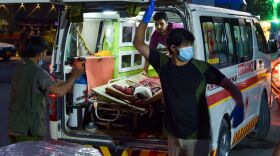With nearly 200 Afghan refugees expected to arrive in Austin by the end of next month, the Austin Independent School District is preparing to welcome the children of those families into its classrooms.
Thousands fled Afghanistan after the Taliban took control of the country's government earlier this month. Many who worked with the U.S. military in some capacity are relocating to Texas with their families through Special Immigrant Visas.
District officials said they still don't know how many children they'll receive. The district already serves over 700 refugee students, including about 300 from Afghanistan. Eleven new Afghan students enrolled at AISD schools at the start of the school year, they said.
The school district has an office that works as a language and resource hub for refugees and asylum-seekers in the district. Refugee family support coordinator Salimah Shamsuddin said her team trains teachers on ways to make their classrooms more inclusive for those newly arrived students.
"Something as simple as adding a map in the background and asking students like, 'Hey, where are you from? Why don't you pin the country that you're from?' That can make the classroom inclusive," Shamsuddin said.
Once these students arrive and the district receives a referral from their refugee resettlement organization, Shamsuddin said her office contacts parents to help with registration and enrollment.
The district's refugee family support office also tests students' English proficiency and provides interpreters for families since many of them only speak Dari and Pashto, the two official languages of Afghanistan.
The office’s three-person team speaks 10 languages between them, but they also hire contracted interpreters when needed.
In the classroom, Shamsuddin said her office makes sure there are teachers who are certified in teaching ESL, or English as a second language.
Shamsuddin said they'll also be training teachers to recognize signs of trauma so that students can be referred to the right counselors and mental health providers. The district has an in-house mental health clinic, and also works with external trauma-centered community centers.
Shamsuddin said part of her work has been checking in with the new students, since many still have relatives in the war-torn country.
"Just last week, I was on a call with a high school Afghan student that was telling me about his cousin being stuck in Kabul airport," she said. "He's constantly checking the news and feeling so helpless being here. And so what does that look like, and what can we do?"
Shamsuddin said the incoming families' needs go beyond the classroom. Things like housing, food stamps and health insurance are also important. But for many, making sure their kids are getting a quality education is a priority.
"Providing that support, making sure that parents know what's going on in the classroom, informing them in their home language, I think that is really important," Shamsuddin said.
Refugee Services of Texas is looking for gift cards, volunteers and donations. Find out more ways to help here.










